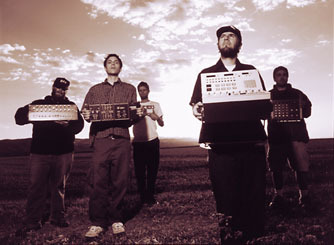1) He’s Simple, He’s Dumb, He’s the Pilot; 2) Hewlett’s Daughter; 3) Jed the Humanoid; 4) The Crystal Lake; 5) Chartsengrafs; 6) Underneath the Weeping Willow; 7) Broken Household Appliance National Forest; 8) Jed’s Other Poem (Beautiful Ground); 9) E. Knievel Interlude (The Perils of Keeping It Real); 10) The Miner at the Dial-a-View; 11) So You’ll Aim Toward the Sky
Maybe not the magnum opus but I can very easily see how you could make a case for it. The definition of Grandaddy's music.
Key tracks: "He's Simple, He's Dumb, He's the Pilot", "The Crystal Lake", "So You'll Aim Toward the Sky"
Grandaddy’s defining statement. Perhaps not their best album - I for one don’t think it is - but the perfect summation of everything that springs to mind when you look at Grandaddy analytically and split the music into its foundations. It is the best representation of their music and the best description of what made them unique. You could call The Sophtware Slump their thematic peak: even if you regarded one of their other albums as your favourite in terms of quality, odds are The Sophtware Slump still displays the special sides of Grandaddy you love the band for more prominently than your album of choice in its design and themes.
In terms of tangible sound The Sophtware Slump bears little difference to the other albums. The distorted guitars, the fuzzy synths, the lo-fi aesthetics and Lytle’s ever-weary, ever-bittersweet voice are all here just as they’re on every single other Grandaddy album. The songwriting is a (major) step up from Under the Western Freeway but otherwise mostly in par with the subsequent albums. The key difference is that the thematic undertones that lie all over the Grandaddy discography are most prominent here. No one ever forgets to mention Lytle’s preferred lyrical material because it is so deeply entwined to the band’s sound and affects the music in several levels: the idea of looking at humanity through technology, analysing human existentialism through our relationship with machines and what we’re developing the machines into, has always been central to Grandaddy’s music to such extent that it’s a defining characteristic of theirs. Lytle’s tales of anthropomorphised machinery and people getting lost in the modern world had such a strong grip that the music around the words reflected them accurately in sound.
It’s this aspect that The Sophtware Slump emphasises more than the other Grandaddy albums. You can see this in all the reviews and articles that reference The Sophtware Slump as a concept album. The songs do not tie in together, outside the Jed couplet, but the thematic consistence is strong enough to make the album feel like they do. Calling it a concept album would require a loose definition of concept, but it’s easy to see where people come from: it feels like one and has great grounds for analysis in such terms. The emphasis on the concept doesn’t mean that you have to study the lyrics in order to get the album: that might give you more fuel for the whole concept album argument, but the concept shows its strength through the overall mood and atmosphere of the album. The music, and Lytle’s voice, is just as lost and vulnerable with or without checking the words and the unified threads and conceptual decisions are audible in every part of the music.

The remainder keeps up a similar pace: it’s Grandaddy as we know them through and through, exploring each facet of theirs. Sometimes it comes in form of a pop song, like the short and sweet “Hewlett’s Daughter” or the largely canonised and actually quite straightforwardly brilliant “The Crystal Lake”, other times it gets close to punk as the band rev it up on “Chartsengrafs”. The Jed the Robot couplet is the emotional heart of the album: “Jed the Humanoid” presents its melancholy via a deceivingly simple but powerful piano build while “Jed’s Other Poem” drowns itself in angry static and fuzz before fizzling out in despair. “Broken Household Appliance National Forest” and “Miner at the Dial-a-View” explore the greater concepts both lyrically and sonically, carrying along in the opening track’s lineage but in a condensed form. “So You’ll Aim Toward the Sky” is a closing bookend to match the opening one - a weary, wistful and heavenly end to a journey that’s the finale of a grand soundtrack and the final emotional push.
There isn’t really a weak link in the chain and it’s that kind of consistency in themes and writing that sets The Sophtware Slump apart from its siblings. Sumday has the big hit tracks but can’t keep up the pace and while Just Like the Fambly Cat is arguably the better of the two albums, its stylistic hodgepodge could be as much a turn-off as a turn-on. The Sopthware Slump is devoted to the concepts that make up the very core of Lytle’s songwriting and Grandaddy’s identity, and that doesn’t undermine the strengths and efforts of the other albums. Instead, it’s a natural center core for the band, acting as a sonical and ideological source for everything else they did. The essence of Grandaddy, if you may.

No comments:
Post a Comment